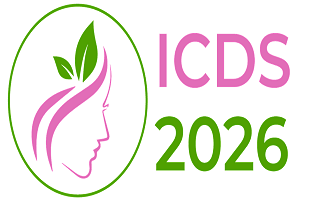Dermatology & Skincare
Address: 9300 Bryn Mawr Avenue, Rosemont, IL 60018, United States
ICDS 2026

Avant, Hong Kong
Abstract:
Background
information:Existing peptide production methods: (i) chemical extraction
or (ii) conditioned medium using animalsourced raw materials, (iii) synthetic,
and (iv) precision fermentation. The
first two not only create an environmental burden and animal welfare issues but
also trigger safety concerns as environmental contaminants may be introduced to
the final product. It is challenging to
trace the material origin and to control batch-to-batch variability. The latter
two, chemically defined, only provide benefits of the single molecule. With our novel patented method, we can produce
cell-identical multiple peptides, meaning the same concoction as what a cell
produces for its functioning, in a fully traceable, sustainable, and
cost-effective way.
Objectives:In this work, we present our patented application of
cultivated cell hydrolysate as a skincare active ingredient and our
BioPlatform. Compared to traditional skincare products containing only one or a
few actives, The ingredient contains all the functional compounds generated
from enzymatic hydrolysis of fish cells cultivated under well-controlled,
traceable, and contaminant-free conditions. Moreover, the entire process is
environmentally friendly as it does not require a continuous supply of animal
or plant-derived materials.
Methodology:
A fish cell line was developed and cultured using an
animal-component-free and chemically defined medium. The cell line was analyzed
for its expression levels of proteins related to extracellular matrix (ECM)
remodeling by Western blot analysis. The cell mass was harvested, sonicated,
and enzymatically hydrolyzed to generate the skincare active ingredient. The
effects of the ingredient on genes for ECM remodeling and on ameliorating
oxidative stress were examined on the human keratinocyte cell line (HaCaT) by
quantitative PCR (qPCR) and by CyQUANT assay respectively. Additionally, the
ingredient was incorporated into an eye cream and tested on human subjects.
Results:
Cultivated fish cells expressed collagen I, connective
tissue growth factor, and decorin proteins. Treatment of HaCaT cells by the
ingredient led to increased expression of genes involved in ECM remodeling
(catenin, collagen, connective tissue growth factor, laminin, fibrinogen,
interleukin, and integrin). Moreover, the ingredient protected HaCaT cells from
H2O2-induced cell death. Topical application of an eye
cream containing the ingredient or placebo on human subjects (30 subjects per
group, twice a day for 28 days) led to no adverse effects in both groups.
Compared to the placebo group, the test group showed improved indicators for
skin hydration, elasticity, firmness, dermal intensity, and reduced crow’s feet
wrinkles.
Conclusion:
The ingredient contains the hydrolysate of
cultivated fish cells. It can act as a potent skincare ingredient as evaluated
in-vitro and on human subjects.
Biography:
Mario Chin PhD has held various positions in the scientific field since 2003. Mario PS began their career as a Visiting Fellow at the National Cancer Institute (NCI) of the National Institutes of Health (NIH). From 2008 to 2011, they were a Principal Investigator at the NIH's National Institute on Drug Abuse (NIDA), an Aaron Diamond Scholar/Investigator at Columbia University's Aaron Diamond AIDS Research Center, and an Assistant Professor at Temple University's Center for Substance Abuse Research and Lewis Katz School of Medicine. In 2014, they became a Scientific Advisor at Amvet Biosciences, and in 2015 they were appointed as an Associate Director at Huaqiao University's Institute of Genomics and a Professor at the School of Biomedical Science. In 2018, they were appointed Co-Founder and Chief Scientific Officer at Avant Meats.
Mario PS Chin PhD obtained a Certificate in Medical Product Development from UC Irvine in 2010. Mario PS obtained a Doctor of Philosophy (PhD) in Molecular Genetics from HKUMed – The University of Hong Kong in 2003. In 1998, they obtained a Bachelor of Science (BSc) in Microbiology and Immunology from The University of Hong Kong.
